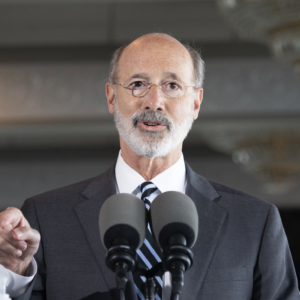Though turnout was small, Pennsylvania voters handed Gov. Tom Wolf a big defeat on Tuesday, handily passing two ballot questions crafted by the GOP-controlled legislature to limit a governor’s emergency powers. The 53-47 percent vote makes Pennsylvania the first state to restrict the executive authority of its governor in this way.
“We, the people. are holding the governor accountable,” Dave Magrogan, a business owner in Concord Township who campaigned for the “Vote Yes” cause, said in a Facebook video. “This was an example of Main Street, suburban Pennsylvania, rural Pennsylvania, speaking up to the governor’s mansion.”
The measure requires the governor to seek legislative approval to continue disaster declarations beyond 21 days unless the legislature votes to extend it. Currently, he has sole authority to declare a disaster emergency and can renew it without legislative approval after 90 days. The legislature is expected to act quickly to put the new limits into action.
Wolf did not immediately respond to requests for comment, but Pennsylvania Republicans were quick to celebrate their victory.
“The people of Pennsylvania have exercised their vote and resoundingly reaffirmed their desire for a government with strong checks and balances that works in their interests and not for its own power,” Pennsylvania Speaker of the House Bryan Cutler (R-Lancaster) and House Majority Leader Kerry Benninghoff (R-Centre/Mifflin) said in a statement. “In doing so, they have rejected the mutation of emergency authority into unilateral, one-person control that seeks expediency over the rule of law.
“We stand ready to reasonably and responsibly manage Pennsylvania through this ongoing global pandemic, the scourge of opioid addiction, and other long-term challenges that may come to face this Commonwealth.”
Chester Chamber of Business & Industry president Guy Ciarrocchi, who supported the ballot questions with a “Vote Yes Chesco” campaign, sounded more relieved than pleased.
“We celebrate these ballot victories not like winning an Eagles-Cowboys game or even celebrating the victory of candidate ‘Jones’ over ‘Smith.’ There are no ‘losers,'” Ciarrocchi said in a statement, explaining that the economic harm from the lockdown lingers.
“Neither our Chamber nor those we spoke for, nor those who joined with us are back to normal,” Ciarrocchi said. “We celebrate, yes; but we mostly breathe a sigh of relief. It’s morning, again, in Pennsylvania—and, the hard work begins now.”
That work may begin in a courtroom, as Wolf and his allies are reportedly considering possible legal action to block the ballot initiatives from taking effect.
“To those contemplating litigation to stop the enforcement of the emergency disaster-related amendments: Think twice before again ignoring the voice of the people,” Cutler and Benninghoff said in their statement. “To use the courts to continue to grasp on to power is to ignore a fresh mandate from those you represent and will confirm the worst fears of a public that wants to change course in the management of emergency periods.”
Critics of Wolf argue he created the backlash by abusing his authority rather than using it judiciously. They say the costs of his lockdown strategies were far higher than the benefits.
“What happened in Pennsylvania is we were shut down longer than any other state in the country, had more services shut down than any other state, while we actually had a higher death rate than many other states,” Magrogan said. “They shut us down harder than anyone else, but we didn’t get a benefit from that.”
Meanwhile, in Montgomery County, the local GOP is looking ahead. “To everyone who worked so hard for VOTE YES yesterday: Thank you! Your efforts made a huge difference and every vote mattered,” it said in a statement.
“Take a victory lap and then redouble your efforts to throw the Democrats out of office who supported Wolf’s power grab this year and next year.”

